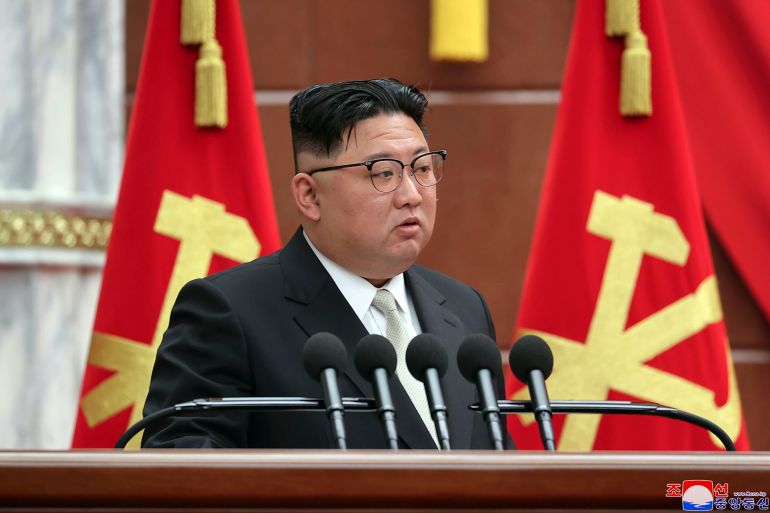North Korea’s Kim orders ‘radical change’ in agriculture
North Korean leader calls on officials to meet production targets after South Korea warns of “grave” food situation.

North Korean leader Kim Jong Un has called for a “radical change” in agricultural production amid concerns over reported food shortages in the isolated country.
Kim emphasised the importance of meeting grain production targets and transforming production to lay the “foundation for the stable and sustained development of agriculture” during the second day of a key party meeting, the state-run Korean Central News Agency reported on Tuesday.
Keep reading
list of 4 itemsIn West Bank, settler violence forcing out Palestinian Bedouins
Photos: Agriculture cuts into Argentina’s Gran Chaco forest
Photos: Climate change puts Cuba’s agriculture under threat
“He expressed the fixed determination and will of the Party Central Committee to bring about a revolutionary turn in the agricultural production without fail, saying that nothing is impossible as long as the strong leadership system is established in the whole Party and there is the united might of all the people,” the KCNA said.
Kim, the third generation of his family to rule secretive North Korea, made his remarks less than a week after South Korea’s Unification Ministry said its northern neighbour appeared to be facing a “grave” food situation and that it had received reports of starvation deaths.
In a report last month, the United States-based think tank 38 North said that North Korea’s 2020-21 harvest cycle had “probably failed to satisfy minimum human needs”, and the country was now teetering on the brink of famine.
“The evidence presented thus far points to a significant deterioration in living conditions and an ongoing complex humanitarian emergency with food insecurity at its core,” the report said.
“The long-term solution to North Korea’s chronic food insecurity lies partly in a resolution of the nuclear issue — potentially bringing about significant economic sanctions relief, along with a less militaristic and revanchist position, as well as resumed trade with the US and its allies.”
North Korea has often suffered from food shortages, including a devastating famine in the 1990s estimated to have killed somewhere between 240,000 and 3.5 million people. Analysts say the current food shortages were triggered by a combination of poor harvests and extreme weather, as well as lockdowns and reduced trade with China during the COVID-19 pandemic.
North Korea’s official Rodong Sinmun newspaper last week called for greater economic self-reliance and railed against accepting assistance from “imperialists”, likening outside aid to “poisoned candy”.